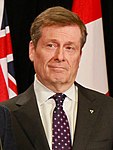2014 Toronto Mayoral Election
|
|
|||||||||||||||||
|---|---|---|---|---|---|---|---|---|---|---|---|---|---|---|---|---|---|
|
|||||||||||||||||
| Opinion polls | |||||||||||||||||
|
|||||||||||||||||

|
|||||||||||||||||
|
|||||||||||||||||
The 2014 Toronto Mayoral Election took place on October 27, 2014. Incumbent Mayor Rob Ford was running for re-election, but dropped out after being diagnosed with a tumour to instead run for city council in Ward 2. Registration of candidates began on January 2, 2014, and ended September 12, 2014, at 2 pm.
The election was won by former Progressive Conservative Party of Ontario leader and 2003 mayoral runner-up John Tory, who defeated Ford's brother, city councillor Doug Ford, and former Trinity—Spadina MP Olivia Chow. More than 980,000 Torontonians cast ballots in this election - a record turnout of 60 percent.
Official results from the City of Toronto as of October 28, 2014.
At the close of nominations on September 12, 2014, 67 candidates were registered as per the City of Toronto website. Eighteen candidates had withdrawn including incumbent mayor Rob Ford. Two of the candidates who withdrew ended up re-registering and subsequently withdrawing again.
According to Nanos Research opinion poll conducted in July 2014 during the election campaign, the main issues concerning the voters were: public transit, high property taxes, jobs and the local economy and traffic.
Chow's transit strategy focused on buses under the slogan of "Better bus service. Now." Some of the details included “more comfort and dignity” to bus commuters and adding 10% capacity during peak periods. Rob Ford's plan revolved around subway expansion, building 32 km of subway at an estimated cost of $9 billion. Doug Ford's policy mirrors mayor's pro-subway agenda. Tory presented his SmartTrack plan for transit – a 53-kilometre, 22-stop network that would run on existing commuter rail tracks.
If elected, Chow would propose a 1% hike on the levy charged to properties sold for over $2 million. Rob Ford promised to keep property taxes “well below” the rate of inflation. Tory pledged to keep property-tax increases within the rate of inflation.
Chow plans to boost economic opportunities by making Toronto the main trading hub for the Chinese currency in North America and Tory considers the mayor’s job to “be the principal sales person and ambassador for the city.”
...
Wikipedia



